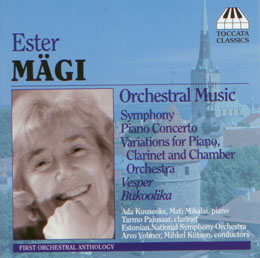< Records
ESTER MÄGI – Orchestral Music. Arvo Volmer, Mihkel Kütson. Toccata Classics 2007

Toccata Classics 2007
TOCC0054
Ada Kuuseoks, Mati Mikalai (piano)
Tarmo Pajusaar (clarinet)
Estonian National Symphony Orchestra
Conductors ARVO VOLMER, MIHKEL KÜTSON
Ester Mägi
Symphony (1968)
Piano Concerto (1953)
I Allegro
II Andante sostenuto
III Allegro
Variations for Piano, Clarinet and Chamber Orchestra (1972)
Vesper (1990)
Bucolic (1983)
REVIEWS
CD with orchestral music of Ester Mägi was the Gramophone‘s Editor’s Choice of this month’s most outstanding new discs:
A delightful survey of works by the ‘first lady of Estonian Music’.
A most compelling introduction to the music of a composer who will be unfamiliar to many, Ester Mägi. A leading figure in the Estonian music scene, her works have a healthy flavour of that country’s folk music. The Estonian forces here do her proud in a splendid, very enjoyable disc.
Ester Mägi (b1922) is a much revered figure in her home country, Estonia, and increasingly recognised abroad. Her music is tonal and influenced by folk traditions (as a student she collected folksongs). Although aware of post-war compositional trends, she has taken what she liked from these without slavishly jumping between bandwagons.
Her Piano Concerto (1953) is a student work, well crafted in a broadly traditional framework (think Grieg meets Shostakovich’s Second), full of attractive melodies and deftly orchestrated. Such a work was expected, of course, while Estonia remained in Stalin’s baleful grip, but Mägi took the opportunity to experiment quietly within on how to develop her material. The Variations (1972), one of her most popular pieces, shows a different approach: wanting to avoid the standard three-movement format, she used variations as the template for this compact double concerto for piano, clarinet and strings. In the purely orchestral Bukoolika (1983), herding songs and birdcalls merge with her own themes to create a delightful and gently individual tone-poem.
The premiere of her Symphony (1968) elicited controversy; was it “possible at all for a woman to write such music”! Harder in tone, the music is driven and forcefully rhythmic, the three movements forming a cogent if unorthodox musical argument. By contrast, the evocative Vesper(1990, rev 1998) looks back to pre-classical sacred music. The performances – recorded between 1992 and 2002 by Estonian Radio – are excellent, their remastering splendidly executed by Raphaele Mouterde. An absolute gem of a disc, strongly recommended.
Guy Rickards, Gramophone, November 2007

 EST
EST